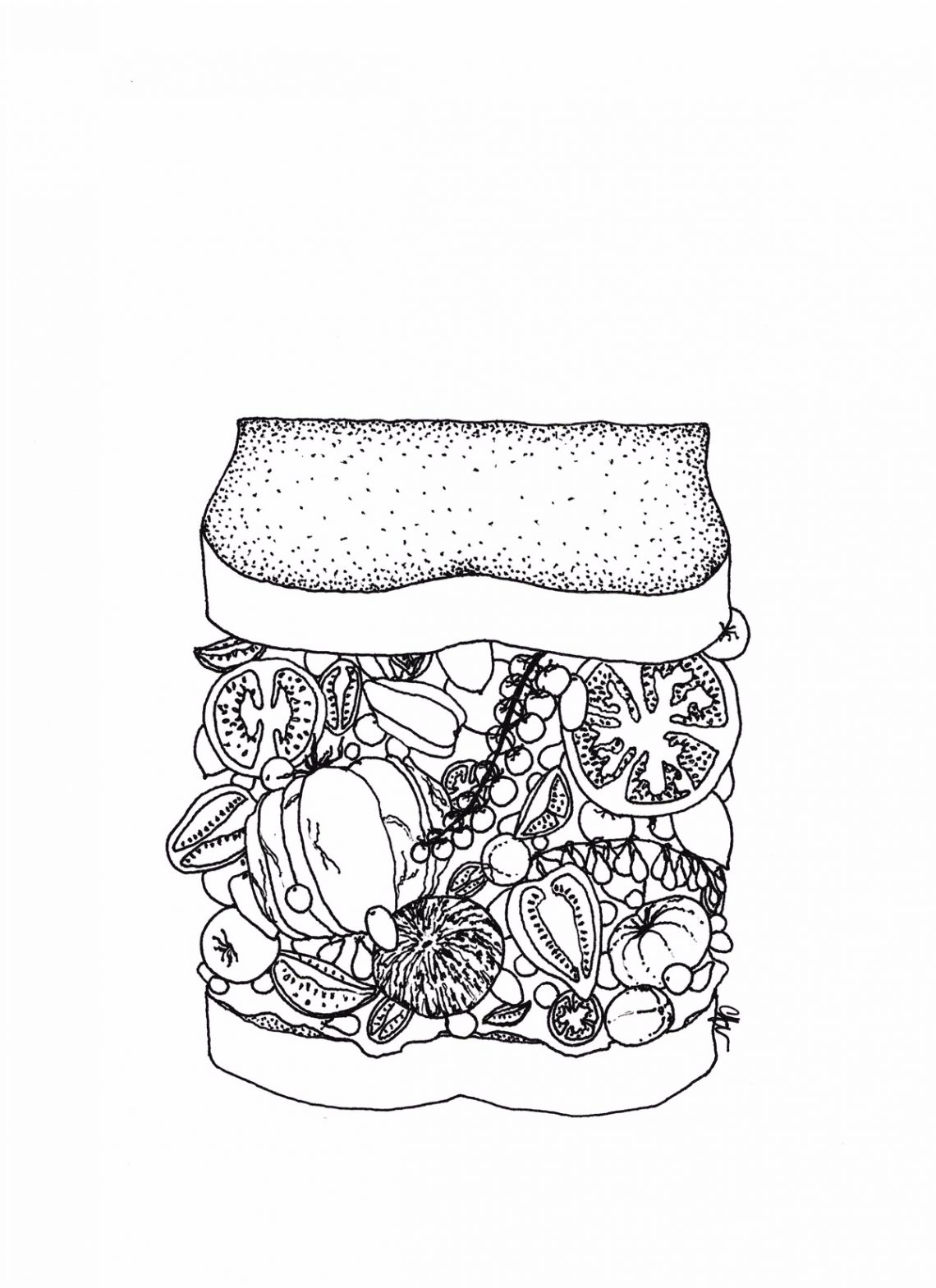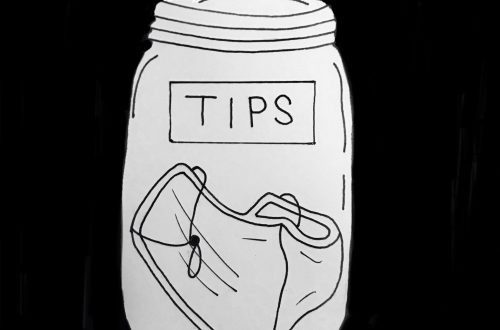by Lauren Maxwell
Lauren’s essay appears in Episode 20 of The Dirty Spoon Radio Hour.
Like every Southerner, I know where to buy tomatoes. I don’t waste time, especially in July or August, with anything less than decadent. Cut your tomatoes and sprinkle with salt, if you’re rushed. Eat with a knife and fork, if you’re me.
With more time on your hands, toast two slices of bread and cover them all the way to the edge with Duke’s Mayonnaise. Add high summer slicers, understanding that cool fruit and warm toast will meld into something resplendent and rare. Use salt, and be generous with pepper. Your sandwich gets nothing else if you’re a purist. Most Southerners are.
Bite. Taste. Remember where you came from. Relish the whole, somehow greater than its parts, just like the South itself.
When I left South Carolina in 2007, I swore I’d never return. I didn’t introduce myself as “Southerner” in any setting. If anything, I was ashamed of my home’s reputation. Why then, am I still obsessed with tomato sandwiches a decade and a half later?
I suspect the answer begins somewhere in the summer of 2006, when I house-sat for two college professors in upper South Carolina. My voice teacher lived in the same neighborhood, and like a true native, she told me to take tomatoes from her yard anytime I wanted.
“Put them on white bread with mayonnaise and salt,” she added.
I followed her advice, though I only had wheat and it worked just fine. Coming off years of cafeteria food, my teacher sparked a childhood memory I didn’t know I had: Tomato sandwiches are the simplest southern lunch. Arguably, they’re also the best.
I ate one every day for the remaining stretch of summer.
Bite. Taste. Remember where you came from. Relish the whole, somehow greater than its parts, just like the South itself.
Still, a year later, as a 22-year-old signing up for hopes, dreams, and student loans, I finally left the South and was eager to be gone. Graduate school made me a resident of Baltimore, Maryland for three years. I had a kitchen for the first time. Intrigued, my experiments in cooking began. Pasta, stuffed eggplant, and vegetable soup. A pizza-making party with friends. Heart cookies mailed to my mother on her birthday. Though my cooking improved, tomato sandwiches never crossed my mind.
Many students went home for the summer, but not me. There was nothing for me there. In Baltimore, I made friends, went to the bar, and worked at the library and the mall. I discovered the Farmer’s Market downtown, right underneath the expressway. When people asked where I was from, I answered with a little pang of shame.
“I’ll never go back,” I sometimes added.
In Baltimore, I ate thin-crust pies from a shop called Iggies, Berger cookies drenched in chocolate, and enough crab cakes to last a lifetime. I never bought fresh, local tomatoes. In my final months there, I took a new boyfriend to a rooftop where we had crabs and seafood caught that morning by our server’s grandfather. Along with the food, they gave us lemon, Old Bay, and a pitcher of beer. Life was simple and exhilarating, just like our lunch.
Soon, I followed that boyfriend to Cleveland, where we would become engaged the following Spring. In Ohio, my diet changed again.
We lived in little Italy, where we ate handmade doughnuts, fresh spaghetti, and a pizza sprinkled with so much pepper we’ve been talking about it since. There were trips to Westside Market, where we bought cheese from vendors who’d been there for 150 years. We found a French spot for special occasions. Our Cleveland kitchen was the first one we shared –– there have been seven more since –– and while in it we began what would become a lifelong tradition of feeding each other thoughtfully and well.
Our year in Cleveland marked the height of the Great Recession, and despite having four and a half degrees between us, despite having been told it would all work out if we did the right things, it felt impossible to find the work we needed.
After nine months in Ohio, I got a job that seemed promising in Vermont. Too young and hopeful to notice the red flags, we packed a truck and headed that way. We were only in that tiny state for four months, and though it was summer, there was no time for tomatoes. There was only stress. I ate cafeteria food and said a prayer of thanks when that chapter concluded.
We were only in that tiny state for four months, and though it was summer, there was no time for tomatoes. There was only stress.
Desperate for answers and looking for work, we left Vermont that fall and headed in the same direction I’d sworn off years earlier. As the South encroached upon us, we considered where to go. Back to Atlanta, my husband’s hometown, or perhaps Nashville, where we had connections –– we explored it all. After three weeks in my mother-in-law’s spare bedroom, I got a job in Greenville, South Carolina, a small city nestled at the base of Appalachia.
South Carolina was the last place I wanted to end up, but it seemed we had no choice. One year led to another in the South, and despite career changes, we stayed put. Greenville rests at the lower tip of the Blue Ridge Mountains, and that alluring silhouette kept us occupied longer than anticipated.
Still, when traveling, I didn’t like being asked where I was from. “I’m not what you think,” I wanted to say, as I remembered my evangelical upbringing, chaotic and disappointing. I’d abandoned those roots the second I left home.
Paired with the constant invitation of the mountains was the opportunity a place like Greenville offered for us to place our feet on the ground. It wasn’t what we’d imagined, but we were able to pay our bills and after those harrowing Recession years, that felt like enough. Every time Greenville’s size and homogeneous nature started to feel confining, we got creative and tried something new. We traveled and read books and made friends.
In my years outside the South, and even after I returned, people were often surprised to learn I’m a native.
“You have no accent!” they exclaimed.
“Yeah, I know. It disappeared,” I responded, blaming it on all the diction classes that come with two opera degrees.
Videos from childhood prove that at one time, my accent was strong. I began to wonder if my education had indeed erased it, or if it might have been my resentment.
Videos from childhood prove that at one time, my accent was strong. I began to wonder if my education had indeed erased it, or if it might have been my resentment.
Though I recognized strengths in Southern communities, I was also painfully aware of where they fell short –– and where they’d failed in the past. After my strange childhood, I’d dreamed of a progressive and urban lifestyle. My family ties are limited, so I assumed my connection to the South was, too.
After a few months in Greenville, I made my way to the local Farmer’s Market, just like I’d done in Baltimore and Cleveland. The year was 2012, and the slow food movement was rising in the Carolinas. In other words, heirloom tomatoes were everywhere. Still on a student budget, I figured out visiting the market closer to noon meant cheaper tomatoes. Before I knew it, with those discounted heirlooms as a gateway, the flavors of the South elbowed their way back into my kitchen, and eventually, my heart.
I impressed my soon-to-be husband with staples from childhood. Vegetables were better than any I’d had before, grown right down the road. The tomatoes from the Farmer’s Market –– sliced, salted, candied, or roasted –– never left us lacking.
At some point, dizzy with summer’s bounty, my old reflexes kicked in. I pulled out my toaster for a tomato sandwich. It all rushed over me then –– how tomatoes from my grandfather’s garden appeared constantly at our backdoor as a kid, how they were bursting with flavor, and how BLT night always felt like a treat from my mom.
Everyone I’d known in the South used food to take care of each other, no matter how much trouble they had getting along.
Before I knew it, I was eating tomato sandwiches every day again for lunch. Cherokee Purple, Beefsteak Slicers, Dixie Golden Giants; I tried them all. There in the kitchen, I found a way back home –– both to myself and the South.
Everyone I’d known in the South used food to take care of each other, no matter how much trouble they had getting along.
In a region fraught with brokenness and political tension, the South’s favorite sandwich offers some comfort. It reminds me that food –– making it for others, eating and sharing it –– is a system of hope and care. It links me to my mother, my mother’s parents, and their parents before them, even if it’s one of the only things we have in common.
No matter how many times our identity shifts, our senses never change. The things we ate as a child –– sometimes in spite of ourselves, and almost always relating to place –– provide a sense of belonging that can’t be denied.
More than one thing can be true at a time. I can be a Southerner, the kind who eats tomato sandwiches every day and feeds friends to show she cares, but remain weary of our past.
This sandwich –– summer’s fleeting, succulent treat –– is brilliant in its simplicity. It’s a reminder that sometimes, we can let things be easy. We can accept them as they are, beauty and shortcomings all included.
When I ask myself if I’m actually Southern, the tomato sandwich seems to have the answer. And it doesn’t let me forget.
Custom artwork by Ashley Ioakimedes

About Lauren Maxwell
Lauren Maxwell is a writer living at the southern tip of the Blue Ridge Mountains. She helps organizations of all kinds communicate, and her zine, how to uncover SELF in chaotic times, can be found in shops around the world. She writes a weekly column called WE’RE ALL FRIENDS HERE.
author photo by William Crooks






